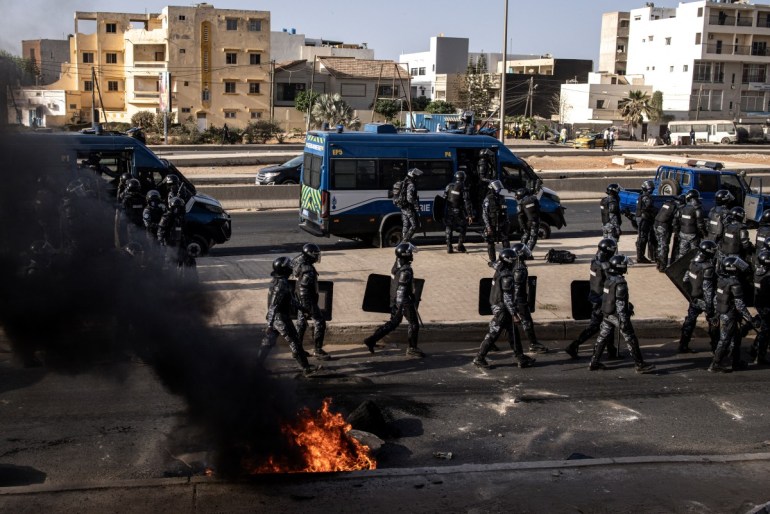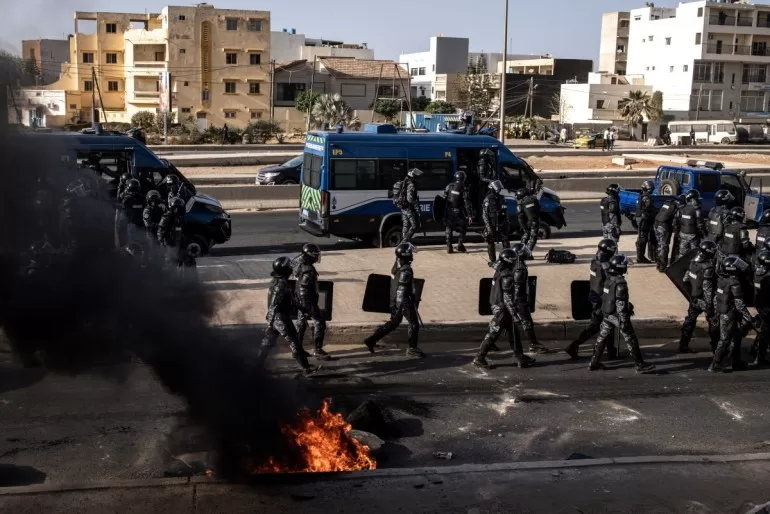Lawmakers were debating on President Macky Sall’s announcement to postpone general elections – originally scheduled for February 25 – for an additional six months.
The announcement has left Fatou Djibril Ndour, 29, in disbelief.
“I am among the people who voted [for] Macky Sall in 2012 and 2019, but I regret. This is not good for a country,” the waitress at a restaurant in the nearby neighbourhood of Ouakam, tells Al Jazeera.
The decision to delay the vote has been controversial and has ignited protests in the capital, and put the police on high alert. The police fired tear gas at opposition supporters on Sunday and beat some with batons.
On Monday, the gendarmerie, or state police, showed up in numbers. Dozens of them in riot gear lined the streets throughout the capital, with some helping disperse a smaller rally outside parliament.
Anta Sarr, 31, a shopkeeper in Ouakam, says the heightened police presence is slowing down business. “I struggle to feed my family, and now, because of just a few people, our clients are afraid to go out,” he says.
Earlier in the day, police tear-gassed protesters and opposition supporters who gathered near the National Assembly. There have also been reports of arrests and intimidation by police.
The right to peacefully protest is guaranteed in the constitution, but the police are disbanding protests before they begin. Journalists say police have prevented them from filming, and law enforcement has threatened to confiscate equipment.
The Ministry of Communication also shut down cellular internet citing security concerns.
“Dear customers,” read a text from phone provider Orange, “By decision of the state, mobile internet is suspended by all operators.”
International watchdog Human Rights Watch warned actions like this are part of a crackdown on opposition, media and civil society.
‘We are at crossroads’
Against this backdrop, customers sat for afternoon coffee at a stand near the National Assembly, discussing events happening just down the street in hushed tones.
“It’s not normal that just one person is making a violation of the constitution,” says bystander Charles Leon Faye.
“[Sall] is not the right person to make these kinds of decisions,” he says. “Senegalese people must organise themselves. We need to organise ourselves to save our country [and] also to try to find a solution to solve these problems.”
It is a critical moment for the country, says political analyst Ibrahima Kane.
“We are at crossroads,” he tells Al Jazeera over the phone. “Either we stop this initiative coming from politicians who always want to overrule, or the constitution will not have any value.”
The television audio from the parliamentary proceedings could be heard through the telephone. Kane had been glued to the screen all day. His phone was buzzing with people keen to get his take on the vote in parliament.
“You know, our political system is just going from bad to worse,” he says.
“Any idea of postponement is unconstitutional. The constitution forbids any changes on the duration of the term, to reduce it, or to expand it – it’s not possible.”
In a shop near Dakar’s Mamelle neighbourhood, Cherif Coly looks up at the store’s television with a grin. The live broadcast of parliamentary proceedings was underway. The arguments have gripped both staff and customers.
But the 32-year-old, a crew member at Blaise Diagne International Airport is optimistic.
“This is good,” he says. “President Macky Sall wants to postpone the election so that everyone can participate,” he says. “There were 41 [candidates] who were not allowed [on the ballot]. If the elections are postponed, they will be able to participate.”
Coly wants more people on the ballot, including opposition candidates.

An inflexion point
Last month, the country’s constitutional council released a final list of electoral candidates that excluded opposition leaders Ousmane Sonko and Karim Wade, the son of former president Abdoulaye Wade.
The final list includes Bassirou Diomaye Faye who was nominated by Sonko, as well as Prime Minister Amadou Ba, who is endorsed by President Sall.
Dakar’s former mayor, Khalifa Sall – who has no relation to Macky Sall – is also on the ballot.
Wade served as a minister during his father’s tenure as head of state. The younger Wade was sentenced to six years in prison in 2012 for corruption charges, fined $230m, and was accused of embezzling just as much. He has denied those allegations, dismissing them as politically motivated.
In 2016, after serving half of his sentence, he was granted a presidential pardon.
The politician, who possessed dual Senegalese French citizenship, denounced his second nationality last month to make him eligible to run for office. Senegal’s constitutional court, however, said he was a dual citizen when he submitted his paperwork, rendering him unqualified to run for office.
Coly hopes that a delay could give time for others to join the ballot. He is willing to wait, he says, so that the voters can choose the best candidate.
“These elections are very special because we have gas, we have petrol, we have other resources here in Senegal,” he says. He wants a president who can manage those resources as well as the country’s finances.
“If the president is not strong enough, people will lose [these resources],” he adds. “If you look at countries with natural resources, you have war there. These countries are not stable, so we need a president who is going to fight for the national resources because it belongs to all Senegalese.”
Senegal is often touted as a beacon of peace and stability in the region. But now, that legacy is in the hands of lawmakers who have brought Senegal to an inflexion point, says Kane.
Late on Monday, they voted to delay elections till December, leaving many worried about the impact on the political landscape.
“Politicians are also citizens of the country,” Kane adds. “They are not above the constitution, particularly the President of the Republic, who is the guarantor of the implementation of the constitution.”
